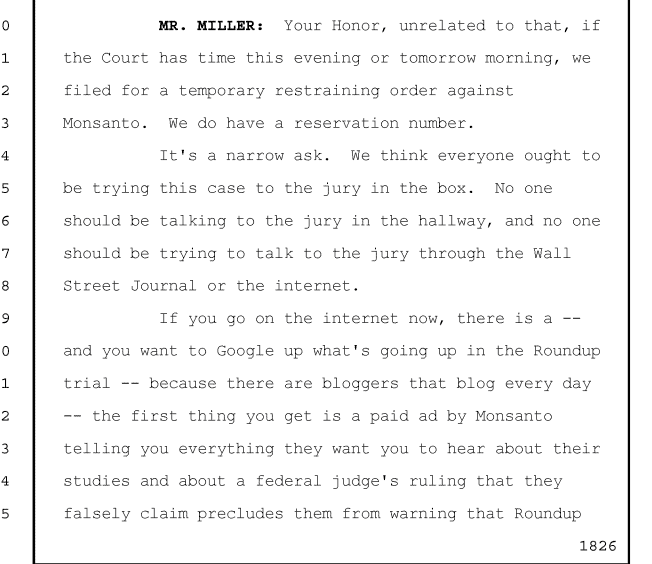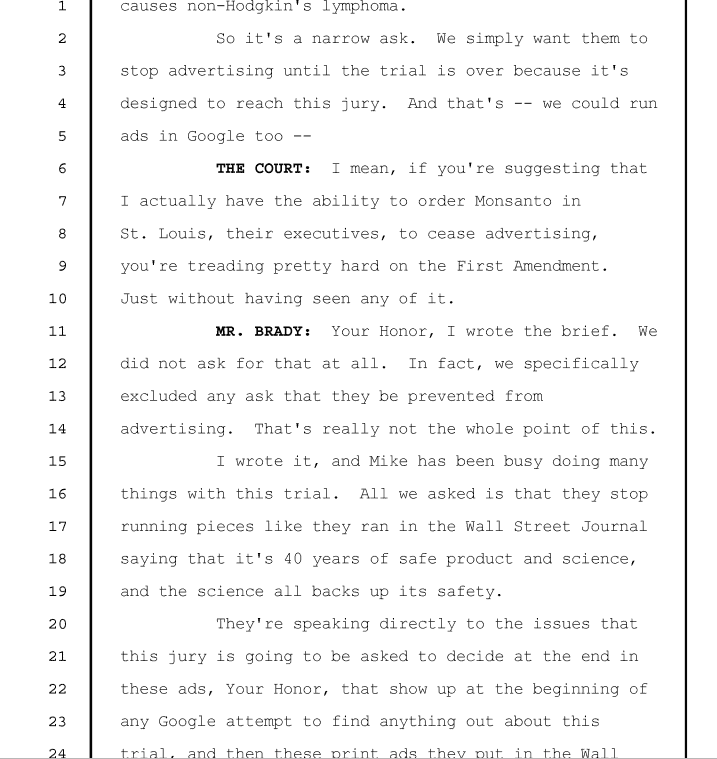U.S. District Judge Vince Chhabria is asking Monsanto and its new owner Bayer AG to begin mediation with lawyers for cancer victims who have sued Monsanto alleging its Roundup and other glyphosate-based herbicides cause non-Hodgkin lymphoma.
Chhabria’s move comes in the wake of an $80 million jury award to plaintiffs Edwin Hardeman last month in his courtroom. And last summer plaintiff Dewayne “Lee” Johnson was awarded $289 million by a jury in state court, though the judge in that case lowered the damages to $78 million.
Chhabria had warned that he might make such a move, but had indicated that he would likely wait until three trials had been concluded before pushing for a settlement. The third Roundup cancer trial has only just gotten underway, however.
As he pushes the parties to settle, Chabbria has vacated the May 20 trial date that was set for the next federal trial. That case, Stevick v. Monsanto was filed in April 2016 by Elaine Stevick, who has non-Hodgkin lymphoma, and her husband Christopher Stevick. The couple attended portions of the Hardeman trial.
Roughly 11,000 plaintiffs have sued Monsanto, which was purchased by Bayer last summer. More than 800 of those lawsuits are being overseen by Chhabria as federal multidistrict litigation. Several thousand more are pending in state courts around the country.
Observers have speculated that a global settlement might run between $3 billion and $5 billion.
Bayer has echoed Monsanto’s long-standing position that Roundup and the other glyphosate-based herbicides within the corporate portfolio are safe and do not cause cancer. But investors in Bayer have been hammering the company’s stock and criticizing Bayer CEO Werner Baumann for paying $63 billion for Monsanto only to become liable for the mass litigation liability. Some are urging a vote of no confidence in Baumann at the company’s annual meeting scheduled for April 26. The company’s shares have lost about 40 percent in value – roughly $39 billion – since last summer’s Johnson trial.
Meanwhile, there were some early sparks flying in the Roundup cancer trial going on now in Alameda County Superior Court. In that case, the married couple of Alva and Alberta Pilliod both have non-Hodgkin lymphoma they allege was caused from their regular use of Monsanto’s herbicides.
Plaintiffs’ attorney Mike Miller asked Judge Winifred Smith to issue a temporary restraining order against Monsanto for heavy advertising the company has been doing in defense of the safety of its herbicides, including a full-page ad in the Wall Street Journal on March 25, the day the voir dire for jury selection in the Pilliod case began.
Monsanto countered by pointing out that plaintiffs’ attorneys have been running plenty of their own advertisements seeking new clients for the Roundup litigation. The motion would amount to an unconstitutional “gag order” and was “dripping with hypocrisy,” Monsanto lawyers argued.
In arguing against an injunction, Monsanto’s attorneys told the judge that The Miller Firm, which is representing the Pilliods and many other plaintiffs, ran an ad in the San Francisco Chronicle alleging a “doubling or tripling” of the risk of non-Hodgkin lymphoma from Roundup exposure a mere seven days before the Pilliod case began. Monsanto said there have been “2,187 anti-Roundup television and radio ads from December 1, 2018 to March 21, 2019” in the local San Francisco media market.
Judge Smith found Monsanto’s argument persuasive and denied the plaintiffs’ request for a limit on the advertising.












